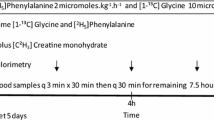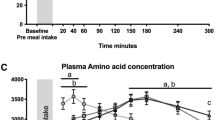Abstract
The aim of the present study was to test if the consumption of creatine incorporated in food bars modifies creatine plasma kinetics, erythrocyte retention and loss in urine and in feces when compared with its consumption in the form of an aqueous solution (AS). Seventeen healthy young men ingested 2 g creatine either in the form of AS, or incorporated in a protein (PP)- or in a beta-glucan (BG)-rich food bar. Kinetics of plasma creatine was measured for 8-h duration and urinary excretion for 24 h. Then, the subjects received the same treatment thrice a day for 1 week at the end of which creatine contents were determined in erythrocytes and in feces (n = 4 for feces). The three crossover treatments were interspaced by a 40 ± 1.2-day wash-out. Absorption of creatine was slowed down by 8-fold in the presence of BG (P < 0.001) and by 4-fold with PP (P < 0.001) whereas the velocity rate constant of elimination and the area under the curve were not modified. Urinary loss of creatine in the first 24 h following ingestion was 15 ± 1.9% in AS and 14 ± 2.2% in PP conditions (NS), whereas it was only 8 ± 1.2% with BG (P = 0.004). Increase in creatine concentration in erythrocyte was similar in whatever form the creatine was ingested. Creatine seems to be totally absorbed since no creatine or creatinine was detectable in feces. No side effects were reported. In conclusion, ingestion of creatine combined with BG facilitates its retention by slowing down its absorption rate and reducing its urinary excretion.






Similar content being viewed by others
References
Archer MC, Clark SD, Thilly JE, Tannenbaum SR (1971) Environmental nitroso compounds: reaction of nitrite with creatine and creatinine. Science 174:1341–1343
Balsom PD, Soderlund K, Sjodin B, Ekblom B (1995) Skeletal muscle metabolism during short duration high-intensity exercise: influence of creatine supplementation. Acta Physiol Scand 154:303–310
Buysse AM, Delanghe JR, De Buyzere ML, De Scheerder IK, De Mol AM, Noens L (1990) Enzymatic erythrocyte creatine determinations as an index for cell age. Clin Chim Acta 187:155–162
Cannan RK, Shore A (1928) The creatine-creatinine equilibrium. The apparent dissociation constants of creatine and creatinine. Biochem J 22:920–929
Chanutin A (1926) The fate of creatine when administered to man. J Biol Chem: 29–41
Crim MC, Calloway DH, Margen S (1975) Creatine metabolism in men: urinary creatine and creatinine excretions with creatine feeding. J Nutr 105:428–438
Dash AK, Sawhney A (2002) A simple LC method with UV detection for the analysis of creatine and creatinine and its application to several creatine formulations. J Pharm Biomed Anal 29:939–945
Dechent P, Pouwels PJ, Wilken B, Hanefeld F, Frahm J (1999) Increase of total creatine in human brain after oral supplementation of creatine-monohydrate. Am J Physiol 277:R698–R704
Deldicque L, Louis M, Theisen D, Nielens H, Dehoux M, Thissen JP, Rennie MJ, Francaux M (2005) Increased IGF mRNA in human skeletal muscle after creatine supplementation. Med Sci Sports Exerc 37:731–736
Derave W, Vanden Eede E, Hespel P, Carmella SG, Hecht SS (2006) Oral creatine supplementation in humans does not elevate urinary excretion of the carcinogen N-nitrososarcosine. Nutrition 22:332–333
Febbraio M, Flanagan TR, Snow RJ, Zhao S, Carey MF (1995) Effect of creatine supplementation on intramuscular TCr, metabolism and performance during intermittent, supramaximal exercise in humans. Acta Physiol Scand 155:387–395
Fitch CD, Sinton DW (1964) A study of creatine metabolism in diseases causing muscle wasting. J Clin Invest 43:444–452
Folin O (1906) Hammarsten’s Festschrift. iii: 1
Francaux M, Poortmans JR (2006) Side sffects of creatine supplementation in athletes. Int J Sports Physiol Perf 1:309–321
Ganguly S, Jayappa S, Dash AK (2003) Evaluation of the stability of creatine in solution prepared from effervescent creatine formulations. AAPS Pharm Sci Tech 4:E25
Green AL, Hultman E, Macdonald IA, Sewell DA, Greenhaff PL (1996) Carbohydrate ingestion augments skeletal muscle creatine accumulation during creatine supplementation in humans. Am J Physiol 271:E821–E826
Greenhaff PL, Bodin K, Soderlund K, Hultman E (1994) Effect of oral creatine supplementation on skeletal muscle phosphocreatine resynthesis. Am J Physiol 266:E725–E730
Guimbal C, Kilimann MW (1994) A creatine transporter cDNA from Torpedo illustrates structure/function relationships in the GABA/noradrenaline transporter family. J Mol Biol 241:317–324
Harris RC, Soderlund K, Hultman E (1992) Elevation of creatine in resting and exercised muscle of normal subjects by creatine supplementation. Clin Sci (Lond) 83:367–374
Harris RC, Nevill M, Harris DB, Fallowfield JL, Bogdanis GC, Wise JA (2002) Absorption of creatine supplied as a drink, in meat or in solid form. J Sports Sci 20:147–151
Hespel P, Op’t Eijnde B, Van Leemputte M, Urso B, Greenhaff PL, Labarque V, Dymarkowski S, Van Hecke P, Richter EA (2001) Oral creatine supplementation facilitates the rehabilitation of disuse atrophy and alters the expression of muscle myogenic factors in humans. J Physiol 536:625–633
Hultman E, Soderlund K, Timmons JA, Cederblad G, Greenhaff PL (1996) Muscle creatine loading in men. J Appl Physiol 81:232–237
Jiao Y, Okumiya T, Saibara T, Tsubosaki E, Matsumura H, Park K, Sugimoto K, Kageoka T, Sasaki M (1998) An enzymatic assay for erythrocyte creatine as an index of the erythrocyte life time. Clin Biochem 31:59–65
Koshy KM, Griswold E, Schneeberger EE (1999) Interstitial nephritis in a patient taking creatine. N Engl J Med 340:814–815
Kreider RB, Ferreira M, Wilson M, Grindstaff P, Plisk S, Reinardy J, Cantler E, Almada AL (1998) Effects of creatine supplementation on body composition, strength, and sprint performance. Med Sci Sports Exerc 30:73–82
Lifschitz CH, Grusak MA, Butte NF (2002) Carbohydrate digestion in humans from a beta-glucan-enriched barley is reduced. J Nutr 132:2593–2596
Louis M, Lebacq J, Poortmans JR, Belpaire-Dethiou MC, Devogelaer JP, Van Hecke P, Goubel F, Francaux M (2003) Beneficial effects of creatine supplementation in dystrophic patients. Muscle Nerve 27:604–610
Maganaris CN, Maughan RJ (1998) Creatine supplementation enhances maximum voluntary isometric force and endurance capacity in resistance trained men. Acta Physiol Scand 163:279–287
McMorris T, Harris RC, Howard AN, Langridge G, Hall B, Corbett J, Dicks M, Hodgson C (2007) Creatine supplementation, sleep deprivation, cortisol, melatonin and behavior. Physiol Behav 90:21–28
Nelson N, Lill H (1994) Porters and neurotransmitter transporters. J Exp Biol 196:213–228
Peral MJ, Garcia-Delgado M, Calonge ML, Duran JM, De La Horra MC, Wallimann T, Speer O, Ilundain A (2002) Human, rat and chicken small intestinal Na+–Cl- -creatine transporter: functional, molecular characterization and localization. J Physiol 545:133–144
Persky AM, Brazeau GA, Hochhaus G (2003) Pharmacokinetics of the dietary supplement creatine. Clin Pharmacokinet 42:557–574
Poortmans JR, Francaux M (1999) Long-term oral creatine supplementation does not impair renal function in healthy athletes. Med Sci Sports Exerc 31:1108–1110
Poortmans JR, Francaux M (2002) Renal implications of exogenous creatine monohydrate supplementation. Am J Med Sports 4:212–216
Poortmans JR, Kumps A, Duez P, Fofonka A, Carpentier A, Francaux M (2005) Effect of oral creatine supplementation on urinary methylamine, formaldehyde, and formate. Med Sci Sports Exerc 37:1717–1720
Poortmans JR, Francaux M (2007) Creatine consumption in health. In: JR Stout (ed) Essentials of creatine in sports (in press)
Preen DB, Dawson BT, Goodman C, Beilby J, Ching S (2005) Comparison of erythrocyte and skeletal muscle creatine accumulation following creatine loading. Int J Sport Nutr Exerc Metab 15:84–93
Pritchard NR, Kalra PA (1998) Renal dysfunction accompanying oral creatine supplements. Lancet 351:1252–1253
Schedel JM, Tanaka H, Kiyonaga A, Shindo M, Schutz Y (1999) Acute creatine ingestion in human: consequences on serum creatine and creatinine concentrations. Life Sci 65:2463–2470
Siedel J, Mollering H, Ziegenhorn J (1984) Sensitive color reagent for the enzymatic determination of creatinine. Clin Chem 30:968
Tarnopolsky MA, Mahoney DJ, Vajsar J, Rodriguez C, Doherty TJ, Roy BD, Biggar D (2004) Creatine monohydrate enhances strength and body composition in Duchenne muscular dystrophy. Neurology 62:1771–1777
Terjung RL, Clarkson P, Eichner ER, Greenhaff PL, Hespel PJ, Israel RG, Kraemer WJ, Meyer RA, Spriet LL, Tarnopolsky MA, Wagenmakers AJ, Williams MH (2000) American College of Sports Medicine roundtable. The physiological and health effects of oral creatine supplementation. Med Sci Sports Exerc 32:706–717
Vanakoski J, Kosunen V, Meririnne E, Seppala T (1998) Creatine and caffeine in anaerobic and aerobic exercise: effects on physical performance and pharmacokinetic considerations. Int J Clin Pharmacol Ther 36:258–262
Vandenberghe K, Goris M, Van Hecke P, Van Leemputte M, Vangerven L, Hespel P (1997) Long-term creatine intake is beneficial to muscle performance during resistance training. J Appl Physiol 83:2055–2063
Welling PG (1977) Influence of food and diet on gastrointestinal drug absorption: a review. J Pharmacokinet Biopharm 5:291–334
Wursch P, Pi-Sunyer FX (1997) The role of viscous soluble fiber in the metabolic control of diabetes. A review with special emphasis on cereals rich in beta-glucan. Diabetes Care 20:1774–1780
Wyss M, Kaddurah-Daouk R (2000) Creatine and creatinine metabolism. Physiol Rev 80:1107–1213
Acknowledgments
The authors are indebted to Francine Loupe-Reding and Vinciane Godaert for their technical assistance, Dominik Grathwohl for his assistance in the statistical treatment of the data and Antoine Audrin, Aylin Harzadin and Jean-Jacques Desjardins for recipes and manufacture of the test bars.
Author information
Authors and Affiliations
Corresponding author
Rights and permissions
About this article
Cite this article
Deldicque, L., Décombaz, J., Zbinden Foncea, H. et al. Kinetics of creatine ingested as a food ingredient. Eur J Appl Physiol 102, 133–143 (2008). https://doi.org/10.1007/s00421-007-0558-9
Accepted:
Published:
Issue Date:
DOI: https://doi.org/10.1007/s00421-007-0558-9




